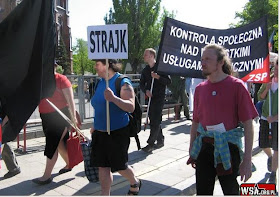On May Day we organized a local demonstration and street meetings in the Praga district of Warsaw where there has been a recent protest movement of tenants who are fighting against rent increases and the reprivatization of some public houses. The day started with a street meeting with residents. related to rent increases which took effect May 1. Although there were fewer people than at recent protests, the neighbours were able to meet and discuss what to do next and how to attract more people to the movement. People were invited to a meeting to discuss an upcoming direct action.
The main May Day event started in front of the Praga hospital. Besides people from ZSP, some comrades from Workers' Initiative and Anarchist Federation came, as well as some non-aligned people, some left activists and some local residents. The situation with the commercialization, restructuring and privatization of health care was discussed. The anarchists explained that we do not people in the two main choices given to people: either bureaucratic state-run health care or commericalized health care. Instead we proposed workers' self-management and public control and co-management of all public services. A lot of anarchist ideas for the reorganization of the work place and society were mentioned. The same ideas were repeated about the Post Office and the railways.
The situation of health-care workers was also discussed. We mentioned the case of the hospital in Bielsko-Biala which would prefer to be re-organized as some sort of collective rather than commericalized. We also reminded people of recent workers struggles and about how difficult it is for health-care workers to protest since they are always accused of "neglecting patients". There are new bills being drafted which would make protests in this sector practically impossible. We sent our solidarity to the nurses from the Barlicki hospital in Lodz who were fired for their union activity.
There was also an explanation of the problems with legislation concerning the maximum working hours, in particular in relation to health-care workers who are forced to work an enormous amount of unpaid overtime. We reminded people of the origins of May Day and how the struggle for the 8-hour day was still urgent 123 years later.
Next, in front of the Post Office, the problems of restructuring and commercialized were explained, as well as the labour problems which people are experiencing in the Post Office. We told about what people were saying on our Post Office Workers' Forum and mentioned the case of Bartosz Kantorczyk who was dismissed from the PO and recently lost his case in court to be reinstated.
There were similar stories about problems in the railways. (The main railways HQ in Poland was on our route.) It was mentioned how the railways plan to cut 7000 jobs and how in some smaller cities these mass layoffs were devastating. We explained the how this had to do with the profit motive more than necessity and how the crisis was being used as a pretext to fire people on masse in many companies and institutions.
Next there was a stop in front of the legendary bazaar which once was full of life... until the chain supermarkets opened. With big corporate competition and rising rents, the main street in Praga, called "Targowa" - or "Trade" Street, named after the once lively trade there - is slowly being taken over by one bank after another. There was a discussion about how this was all part of the larger scheme of gentrification and how big corporate shops replaced some family and individual run shop which had been operating for generations. Once the biggest shop in the neighbourhood was Poland's first cooperative shop: now it is reduced to about 1/15 of its original size and is on the verge of exintinction. There was a tirade against banks and the credit trap which many of the working poor find themselves falling into.
Finally there was a stop in front of the supermarket Biedronka which is well-known for having horrendous working conditions.
At the end of the march, people went to the park to relax on that very beautiful day.







